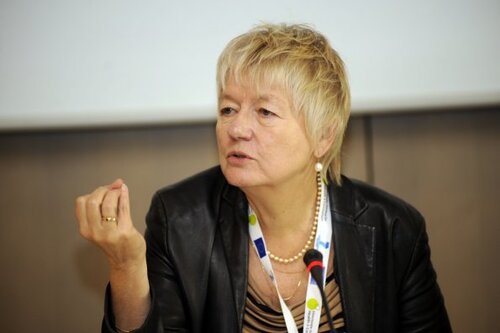Global health leaders and stakeholders gathered in Berlin last...
12 June 2018
An interview with Ilona Kickbusch.

At the UHC2030 Steering Committee meeting on 4-5 June 2018, we warmly welcomed Ilona Kickbusch as the new elected co-chair, joining Dr. Githinji Gitahi, Global CEO and Director General, AMREF Health Africa Group.
Ilona replaces Dr TakaoToda, Vice-President for Human Security and Global Health from Japan International Cooperation Agency (JICA) who we thank for his tremendous work for UHC2030.
It was a good opportunity to ask Ilona some questions about her interest in UHC2030, and what she thinks we can achieve.
What motivated you to join UHC2030 as our new co-chair?
It’s a really historical point in time for global health. There are several windows opening right now through the SDGs and through political commitment of countries. This focus that has developed on universal health coverage (UHC) is a fantastic strategic opportunity, combined with the commemoration of Alma Ata this year, UN activities and the commitments of the Director General of WHO.
So many political streams are coming together, that it has a ‘now or never’ feeling; that either over the next year or two we exploit that to the hilt, or it’s going to be difficult again. I enjoy helping move something forwards strategically, and particularly something that I believe in deeply of course.
Why do you think UHC2030 is in a good position to move this agenda forward?
The uniqueness of UHC2030 lies in its enormous potential. Fantastic groundwork has been laid transforming IHP+ into UHC2030. There is commitment in countries, there is a great sense of being a group, and new work being done to see how to bring the private sector in. It’s ready to go.
Dr Tedros has said frequently that UHC has to be a movement; it cannot be something that is just done by WHO and can’t be done only by the health sector. This will also be a challenge for UHC2030. It doesn’t only bring the ‘true believers’ from the health sector together, the professions and the academics, but it explores how to reach out and draw in other actors that need to be on board including political actors, parliamentarians and civil society.
How do you think it is possible to bring together different stakeholders under the auspices of UHC2030, when there are so many different – and sometimes conflicting - interests and proposals of how to move the agenda forward?
One of the things I teach at my institute is global health diplomacy and the key issue is really first of all to bring people together. Diplomacy is literally about keeping the conversation going. Therefore, it’s very critical that you sit around the table, you are articulate about differences, you are clear about interests but you don’t get caught up in positions.
So UHC2030 should be the platform that allows for these kinds of conversations to happen. Personally, I have no problem with the fact that sometimes those conversations are controversial. We can only move forward if our interests are clearly on the table and we say that this is where we come together.
Obviously, health in its broader sense and health systems are one of the largest industries and economies in the world. If we imagine that this industry is already so big, and still half of the world’s population does not have access, just imagine the potential and the push for growth in this industry.
Therefore, it’s incredibly important to be able to help steer and ensure that this kind of development that is so attractive to many actors for different reasons goes in the right direction of ‘leave no one behind’ and does not serve just commercial interest. People must not fall into poverty or be stressed financially because of health problems. That means for example, working with finance ministers, insurers and talking with industries that are driving change in the health system, such as information technology.
There is tremendous potential and it has to be brought together in a socially responsible way. If UHC2030 can help keep this focus on justice, on social responsibility, on public goods and global public goods, then it has really done its job.
How do you see your role as the UHC2030 Steering Committee co-chair?
The role of the co-chair is of course to provide much more visibility and understanding of what UHC2030 is all about and to position it in the global debate. For example, how can we ensure that such a multi-stakeholder group contributes to the discussion leading up to the UN meeting in 2019? These are critical things.
As my co-chair Dr Githinji Gitahi has said, ensuring that this is relevant at country level is very important and we are therefore very complementary as chairs. Dr Gitahi has very strong knowledge of the country level and I have strong knowledge of health diplomacy in the international arena.
We should have neither too a narrow or too broad understanding of UHC. UHC is not everything, but it is not just health care. Health promotion dimensions and multi-sectorality are really critical issues and therefore we need to draw in other actors and communities. If this is an integrated movement we also have to integrate the disease-focused partners; not to take the focus away from them but rather to be a prism for these multiple agendas. It is a real strategic challenge and we have to face up to it.
Reaching out to people is also very important. Alma Ata and UHC are about people, about their participation in their health systems.
It is exciting, it is lively, it is shaping the future. If UHC2030 can do this, and if the Steering Committee steers it in the right direction, we will be able to contribute to improving the lives of many people around the globe.
